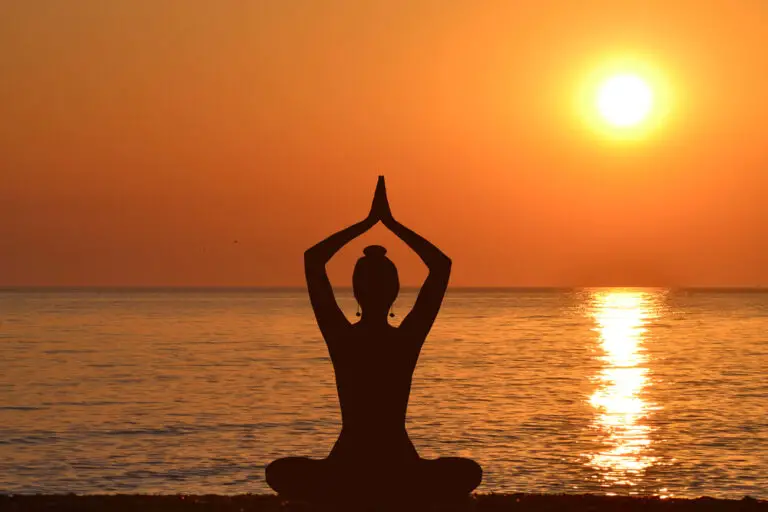40 Powerful Self-Reflection Questions to Ask Yourself
40 Powerful Self-Reflection Questions to Ask Yourself

Self-reflection questions are excellent tools for personal growth and understanding. They allow us to look closer at our thoughts, feelings, and behaviors. By asking ourselves these meaningful questions, we can discover valuable insights that lead to positive life changes. It’s an excellent way to get to know ourselves better!
Self-reflection questions are a wonderful way to explore our actions, motivations, and goals from fresh perspectives. They can help us spot blind spots and discover areas where we can improve, which we might overlook otherwise. It’s a nice little check-in from time to time! Making time for regular self-reflection can boost our self-awareness, and that’s such a valuable tool for making better choices and enjoying a more fulfilling life.
You don’t need any fancy training or tools to start asking yourself these questions! Just carve out a little quiet time and be open to looking inward with honesty. With some practice, self-reflection can become a helpful habit supporting your personal growth and well-being. It’s a wonderful way to stay self-aware and accountable.
What Are Self-Reflection Questions?
Self-reflection questions are wonderful tools for examining our thoughts, feelings, and behaviors. They invite us to pause, look inward, and consider our values, goals, and experiences in a meaningful way.
Self-Reflection Questions and Their Role in Boosting Self-Awareness
Self-reflection questions are thoughtful prompts that we can ask ourselves to gain deeper insights into who we are. These questions make us take a moment to reflect on our thoughts, emotions, and actions. They are incredibly helpful for boosting our self-awareness by:
- Uncovering hidden motivations
- Spotting patterns in our behavior
- Clarifying our values and beliefs
- Revealing areas where we can grow
We develop a clearer picture of ourselves when we regularly engage with these reflective questions. This increased self-awareness empowers us to make choices that reflect who we are.
How Self-Reflection Questions Fit into Our Self-Care Routines
Incorporating self-reflection questions into our daily self-care routines can be really impactful. By doing so, we can:
- Check-in with how we’re feeling
- Celebrate our wins, big or small
- Pinpoint areas in our lives that might need a little more attention
- Set meaningful goals for personal growth
Many people love to write down their responses to reflection questions as part of their morning or evening routine. This simple practice helps us understand ourselves better over time and encourages a growth mindset.
Why Reflection Matters for Our Mental and Emotional Well-Being
Taking time for self-reflection is important for keeping our mental and emotional health in check. It helps us to:
- Process tough experiences
- Manage stress in a healthier way
- Boost our self-esteem and confidence
- Make better decisions
When we take a moment to reflect, we create space to sort through complex emotions. This habit of introspection can lead to greater emotional resilience and a happier, more fulfilled life.
Benefits of Self-Reflection
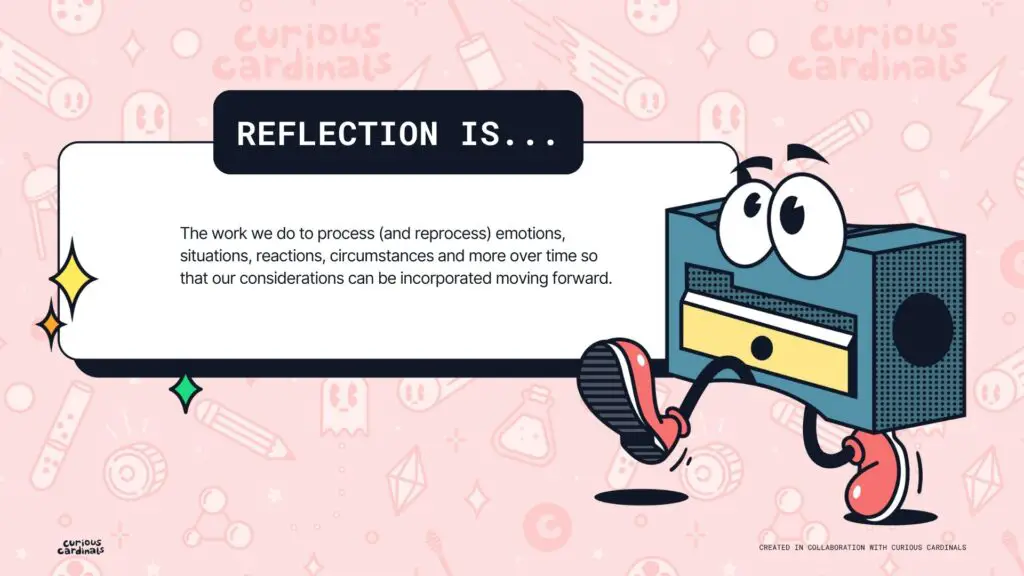
Self-reflection is a wonderful practice that brings many benefits for our personal growth and well-being. It helps us dive deeper into our thoughts, feelings, and behaviors, leading to positive changes in our lives.
Finding Emotional and Mental Clarity
When we take time for self-reflection, we can untangle our emotions and thoughts. This process allows us to see patterns in how we think and react to different situations. Gaining this clarity helps us understand why we feel the way we do and how our past experiences influence our current mindset. By being more aware of our triggers, we can manage our emotional responses better, which is a key part of developing emotional intelligence.
Self-reflection also gives us a chance to recognize our strengths and areas where we can grow. It’s a time to celebrate our successes and learn from our mistakes, which fosters personal development.
Making Better Decisions and Setting Meaningful Goals
Taking time to reflect regularly can really enhance our decision-making skills. We can look back at past choices and their outcomes, picking up valuable lessons that will help us in the future. This practice allows us to align our actions with our core values and long-term goals, so we can set objectives that truly matter to us instead of simply following what others expect.
Plus, self-reflection sharpens our problem-solving abilities. With a clearer mind, we can approach challenges more effectively and consider various perspectives before making a decision.
Building Stronger Relationships by Understanding Our Needs and Emotions
Self-reflection is a fantastic way to improve our relationships. By understanding our own needs and emotions better, we can communicate more effectively with others. It helps us become more empathetic and patient, reminding us that everyone has their own experiences and perspectives. This deeper understanding paves the way for stronger, more meaningful connections.
Additionally, self-reflection empowers us to set healthy boundaries in our relationships. We can figure out what makes us comfortable and what we need from others to feel supported and valued.
Reducing Stress and Embracing Self-Acceptance
Making self-reflection a regular part of our lives can significantly lower our stress levels. By examining our thoughts and feelings, we can pinpoint sources of anxiety and come up with coping strategies. This practice nurtures self-acceptance and self-compassion, helping us embrace our imperfections and treat ourselves with kindness—just like we would with a close friend.
Ultimately, self-reflection encourages us to let go of negative self-talk and unrealistic expectations. It allows us to focus on personal growth instead of beating ourselves up, leading to greater overall well-being and happiness. So, let’s take some time to reflect and enjoy the journey of self-discovery!
How to Approach Self-Reflection
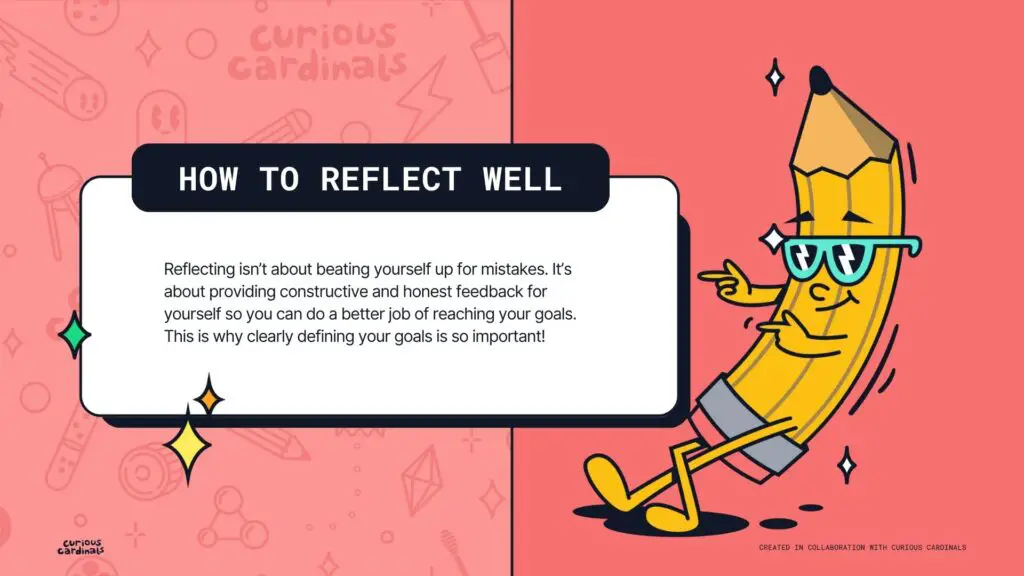
Self-reflection is a wonderful way to gain insight into our thoughts, feelings, and behaviors. By incorporating some simple techniques, we can make it a meaningful part of our daily lives!
Tips for Creating a Cozy Space for Self-Reflection
Finding a calm space really helps us focus inward. Choose a quiet spot where you can relax without distractions. Soft lighting and comfy seating can make a big difference! Some people enjoy lighting candles or playing soft music to set a soothing vibe.
It’s also helpful to set aside a specific time each day for self-reflection. Early mornings or just before bedtime often work wonderfully. Even a short 10-15 minutes can be super effective!
Having a notebook or journal nearby is a great idea for jotting down your thoughts. Journaling can be a powerful tool for self-reflection.
Encouraging Honesty and Openness
When we reflect, it’s important to be honest with ourselves. Don’t hesitate to recognize both your strengths and areas where you can grow. Try to avoid judging your thoughts or feelings as they come up—just notice them with an open heart. This mindset helps us stay curious and open.
Mindfulness techniques can be really helpful to keep us present during our reflections. If you ever feel stuck or anxious, a few deep breaths can work wonders. Remember, be kind to yourself during this process! The goal isn’t to “fix” anything, but to understand ourselves better.
Tools to Support Your Self-Reflection Journey
Here are some handy tools you might find useful:
- Journals or notebooks
- Meditation apps
- Lists of self-reflection questions
- Voice recording apps
- Mind mapping software
You might enjoy trying out guided meditations to help focus your thoughts. Don’t hesitate to experiment with different types to see what you like best!
Setting phone reminders can keep you on track with regular reflection, and using habit tracker apps can help build that consistency. Reading books on personal growth offers fresh insights to reflect on, and sharing your thoughts with a trusted friend can deepen your understanding even more.
Happy reflecting!
40 Powerful Self-Reflection Questions to Ask Yourself
Self-reflection is a wonderful way to grow and get to know ourselves better! To help you on your journey of introspection, I’ve gathered some thought-provoking questions that can really spark your thinking.
- What are my core values?
- Who am I when no one is watching?
- What strengths do I possess?
- How have I changed in the last year, and am I happy with those changes?
- What skills would I like to develop?
- How do I usually handle stress?
- What makes me truly happy?
- How do I define success?
- What are my biggest fears?
- How do I respond to failure?
- Which relationships need a little more attention?
- What habits do I want to change?
- How do I express love to those around me?
- What would my ideal day look like?
- How do I deal with conflict?
- What are my short-term and long-term goals?
- What am I avoiding?
- How do I set my personal boundaries?
- What negative self-talk do I find myself getting caught up in?
- How do I practice self-care?
- How do I contribute to my relationships with others?
- What emotions do I feel most often, and why?
- Are there unresolved issues I need to address?
- What habits/routines are helping me grow – and which are holding me back?
- How often do I step outside of my comfort zone?
- Am I kind to myself in my thoughts and actions?
- How have past challenges shaped who I am today?
- Is there anything from my past that I need to forgive myself for?
- What kind of person do I want to be five years from now?
- Am I living in alignment with my values?
- When do I feel most like myself?
- What or who inspires me, and why?
- How do I want others to feel after interacting with me?
- What is one thing I have always wanted to try – but haven’t?
- What beliefs or opinions have I outgrown?
- What triggers my stress or depression most often, and how do I typically respond?
- How do I recharge when I feel drained?
- What brings me peace in moments of chaos?
- What is something I’ve learned about myself in the past year?
- What is a question I’ve been avoiding asking myself?
Feel free to use these questions as a starting point for your self-exploration. They can guide you in identifying areas where you might want to improve and grow. Happy reflecting!
Practical Tips for Using These Questions
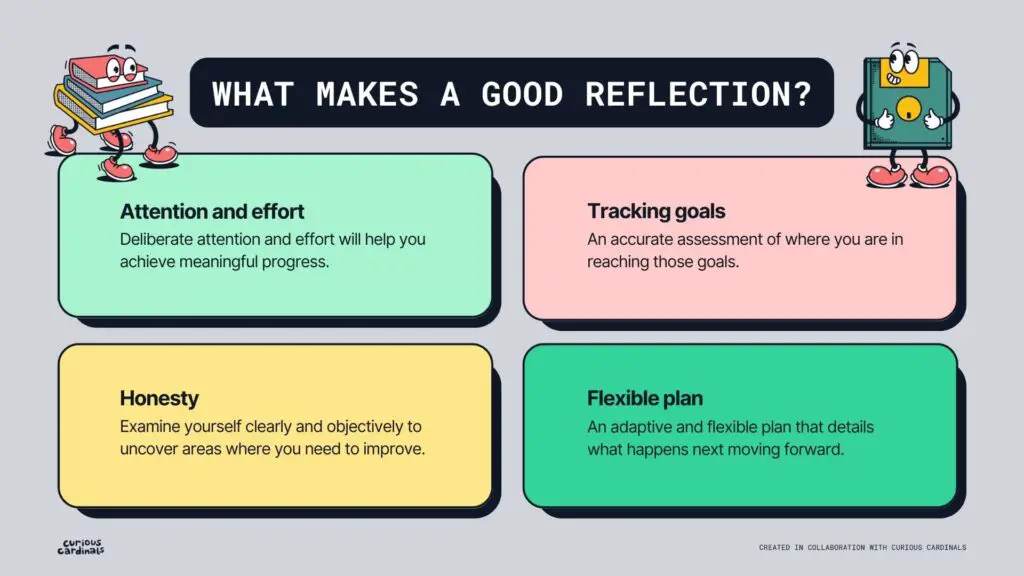
Self-reflection questions can be amazing tools for personal growth, and I’m excited to share some friendly tips on how to make the most out of them in your life!
Journaling as a Fun Daily or Weekly Habit
Journaling is a fantastic way to dive into those self-reflection questions. It’s great to set aside just 10-15 minutes each day or week to focus on this practice. Try picking 1-3 questions to explore during your session and let your thoughts flow without any judgment.
Feel free to experiment with different journaling methods that suit you best:
- Good old pen and paper
- Digital apps that you find handy
- Voice recordings if you’re on the run
Just find what feels right and make it a consistent part of your routine!
Also, consider adding positive affirmations to your entries. They can really uplift your spirit and help you balance any tough realizations you might encounter.
Checking In on Your Progress
It’s important to revisit your self-reflection questions from time to time. This way, you can see how far you’ve come and how your answers may have changed. Setting reminders to check in on specific questions monthly or quarterly can be really helpful. Keep your responses all in one place so you can easily see your growth.
Creating a “growth timeline” might also be fun! You can jot down key insights and track changes in your answers, giving you a visual motivation boost. And don’t forget—sharing your progress with a trusted friend or mentor can bring in some great outside perspectives on your journey!
Be Kind to Yourself Along the Way
Remember, self-reflection can sometimes stir up tough emotions, so it’s super important to be gentle with yourself during this process. Personal growth is a journey, not a race—there’s no need to rush through it!
When challenges arise, practice a little self-compassion. Acknowledge the efforts you’re making, treat yourself like you would a good friend, and don’t hesitate to take breaks when needed.
And celebrate those small victories as you go! Whether it’s adding exciting new things to your bucket list or taking steps toward your bigger dreams, every little achievement is worth acknowledging. Enjoy the journey!
Common Obstacles in Self-Reflection and How to Overcome Them
Self-reflection can be a bit tricky, right? We often run into obstacles that make it tough to look within ourselves. Let’s chat about some common challenges and some friendly tips to help you move past them!
Facing Uncomfortable Truths
Many of us hesitate to dive into self-reflection because we’re worried about what we might uncover. It’s natural to feel anxious about facing painful memories or our deepest insecurities. This fear can keep us cozy in our comfort zones, making it tough to address the parts of ourselves that really need some attention and growth.
A great way to tackle this is to start small! Pick one area to reflect on that feels a little less intimidating. As you gain confidence, you can gradually explore tougher topics. Don’t forget, talking to a therapist can be super helpful—they can provide guidance and support in a safe space.
Finding Time for Reflection
We all lead busy lives, and carving out moments for self-reflection can feel like a challenge. It’s easy to get caught up in the hustle and forget to pause and look inside. This inconsistency can make it hard to notice patterns or see real progress in our personal growth.
To make it easier, try scheduling self-reflection sessions just like any important appointment. Even setting aside just 10 minutes a day can work wonders! You might also link your reflection time to something you do every day—like sipping your morning coffee or winding down before bed.
Helpful Tips with Mindfulness and Self-Care
Mindfulness can be your best friend when facing tough truths. By staying present, you can observe your thoughts without jumping to judgment. If you ever feel overwhelmed, a few deep breaths can help calm those nerves and keep you focused.
It’s also vital to set clear boundaries so you can protect your reflection time from outside interruptions. Don’t forget about self-care! When you take care of your basic needs, you’re more prepared to handle tough emotions.
Journaling is another wonderful way to explore your thoughts and feelings in a safe space. Plus, using positive affirmations can really help you stay motivated and resilient on your self-reflection journey. Remember, it’s all about taking it one step at a time!
Final Thoughts
Self-reflection questions are simple but powerful tools that can really help you grow and gain a deeper understanding of yourself. Taking some time to explore your inner thoughts with honesty and curiosity opens the door to making choices that truly reflect your values and goals. By making self-reflection a regular part of your life, you can create a more fulfilling and intentional journey. The best part? You don’t need any special tools—just an open heart and a desire to grow!
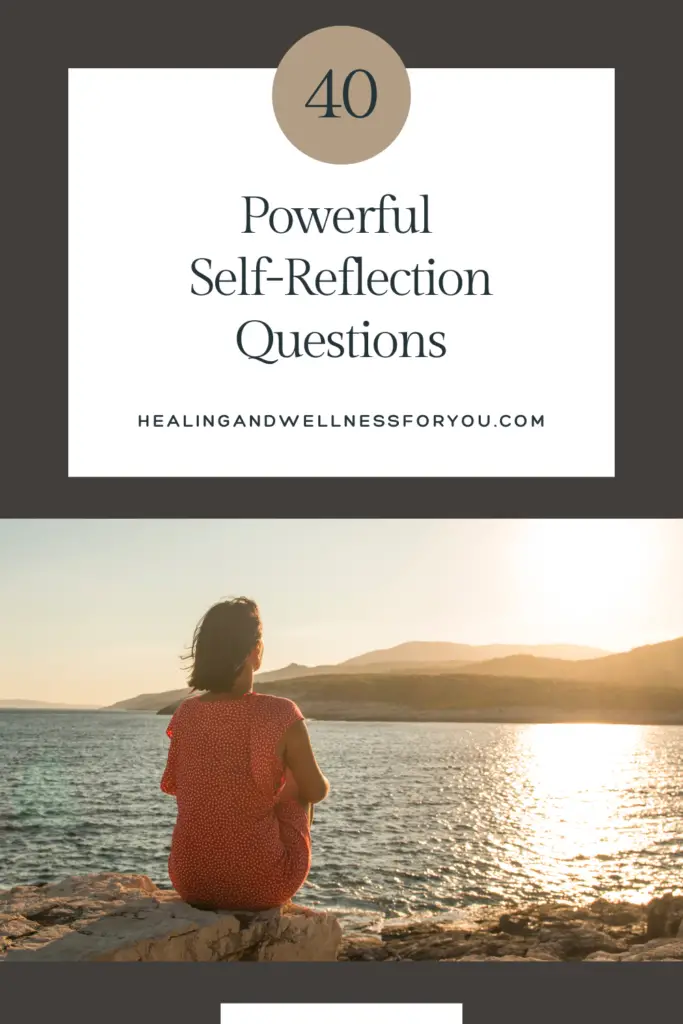
Frequently asked Questions
Taking some time for self-reflection can really help us grow and get to know ourselves better! Here are some questions that dive into key areas of both personal and professional development.
What personal strengths have I discovered about myself?
We all have unique talents and abilities. Reflecting on our experiences can uncover our natural strengths, which may include skills like problem-solving, creativity, or leadership.
Recognizing our strengths boosts our confidence. It also helps us find roles and tasks where we excel.
In what areas do I need to improve to achieve my personal goals?
Identifying areas for growth is crucial for self-improvement. We should honestly assess our weaknesses and skills gaps.
This might involve improving time management, communication, or technical abilities. Setting specific improvement goals keeps us moving forward.
How have my relationships impacted my personal growth?
Our connections with others shape who we are. Close relationships can support our growth and challenge us to be better.
We can reflect on how friends, family, and colleagues have influenced our values and decisions. This helps us appreciate meaningful connections.
What are the core values that drive my decisions and actions?
Our core values guide our choices and behavior. Identifying these values helps us live more authentically.
We might value honesty, kindness, or ambition. Aligning our actions with our values leads to greater fulfillment and purpose.
What have I achieved in my professional life that I am proud of?
Recognizing our career accomplishments boosts confidence and motivation. We should celebrate both big and small wins.
This might include promotions, successful projects, or positive feedback. Reflecting on these achievements can guide our future career goals.
How do my daily activities align with my long-term objectives?
Our daily habits and choices impact our long-term success. We should examine how our routines support or hinder our goals.
This might involve assessing how we spend our time and energy. Making small adjustments can help us stay on track with our larger objectives.
About the Author
Taylor O’Horo, Psychology Major.

Hi! I am Taylor O’Horo, marketing specialist and biofeedback technician. I am a mom to three kiddos – a first responder wife and Veteran spouse. I recently earned my bachelor’s in psychology from Arizona State University and plan to earn my master’s in counseling. Everyone has a story, and I am no different. Overcoming the adversities, I’ve experienced has helped me to learn more about resilience and how to be there for others. I believe all humans can heal!







